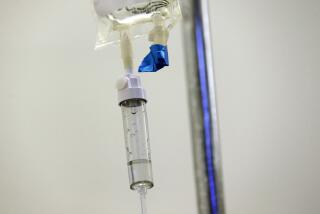Chemotherapy drug shortage threatens leukemia treatment in children
- Share via
A shortage of the chemotherapy drug cytarabine is threatening the treatment of acute myeloid leukemia (AML) in children around the country, with some hospitals rationing supplies of the drug and others turning away new patients. Cytarabine is a key ingredient in the drug cocktails given to such children. “Without it, most patients die,” Louis J. DeGennaro, chief mission officer of the Leukemia & Lymphoma Society, told Bloomberg News. “There’s really no substitute for cytarabine in those chemotherapy regimens.” The drug is also used in the treatment of adults with acute lymphocytic leukemia, but it is apparently not as critical in such drug regimens and it is primarily adults that are being denied access to the drug now.
The Food and Drug Administration said it may allow importation from foreign sources of cytarabine that has not yet been approved for use in the United States to meet the shortfall. The agency did that last year, for example, when there was a shortage of the anesthesia drug propofol. But the agency will first have to ensure that the imported drug meets all FDA safety standards.
Three companies have approval to market cytarabine in the United States: Hospira Inc. of Lake Forest, Ill.; APP Pharmaceuticals of Schaumberg, Ill.; and Bedford Laboratories of Bedford, Ohio. Hospira and APP both encountered difficulties toward the end of 2010 in obtaining the key ingredient in the manufacture of the drug. Once that problem was resolved, both companies then encountered difficulties with the drug crystallizing out in the vials used to contain the injectable liquid, and the product had to be recalled. Bedford said that it did not encounter either of those problems, but that its competitors’ difficulties led to all of its supplies of the drug being depleted. Hospira is now shipping the drug, but in limited quantities insufficient to meet overall demand.
An estimated 43,000 new cases of leukemia are diagnosed in the United States each year, according to the American Cancer Society. About half of them are AML.
ABC News polled major hospitals around the country and found that many had to limit the number of patients receiving the drug, often rejecting new patients so that patients already in the system could complete their drug regimens. Others said they had been receiving referrals from community hospitals that were unable to obtain supplies of the drug.
City of Hope National Medical Center in Duarte, for example, said it had received three such referrals in recent weeks and that it would be extremely difficult to meet the present dosage guidelines if the shortage persists. UCLA’s Jonsson Comprehensive Cancer Center said it had one such referral. The University of Chicago said the shortage has critically affected leukemia clinical trials there and it is actively seeking to borrow the drug from other sources or to initiate sharing agreements.
More to Read
Sign up for Essential California
The most important California stories and recommendations in your inbox every morning.
You may occasionally receive promotional content from the Los Angeles Times.













